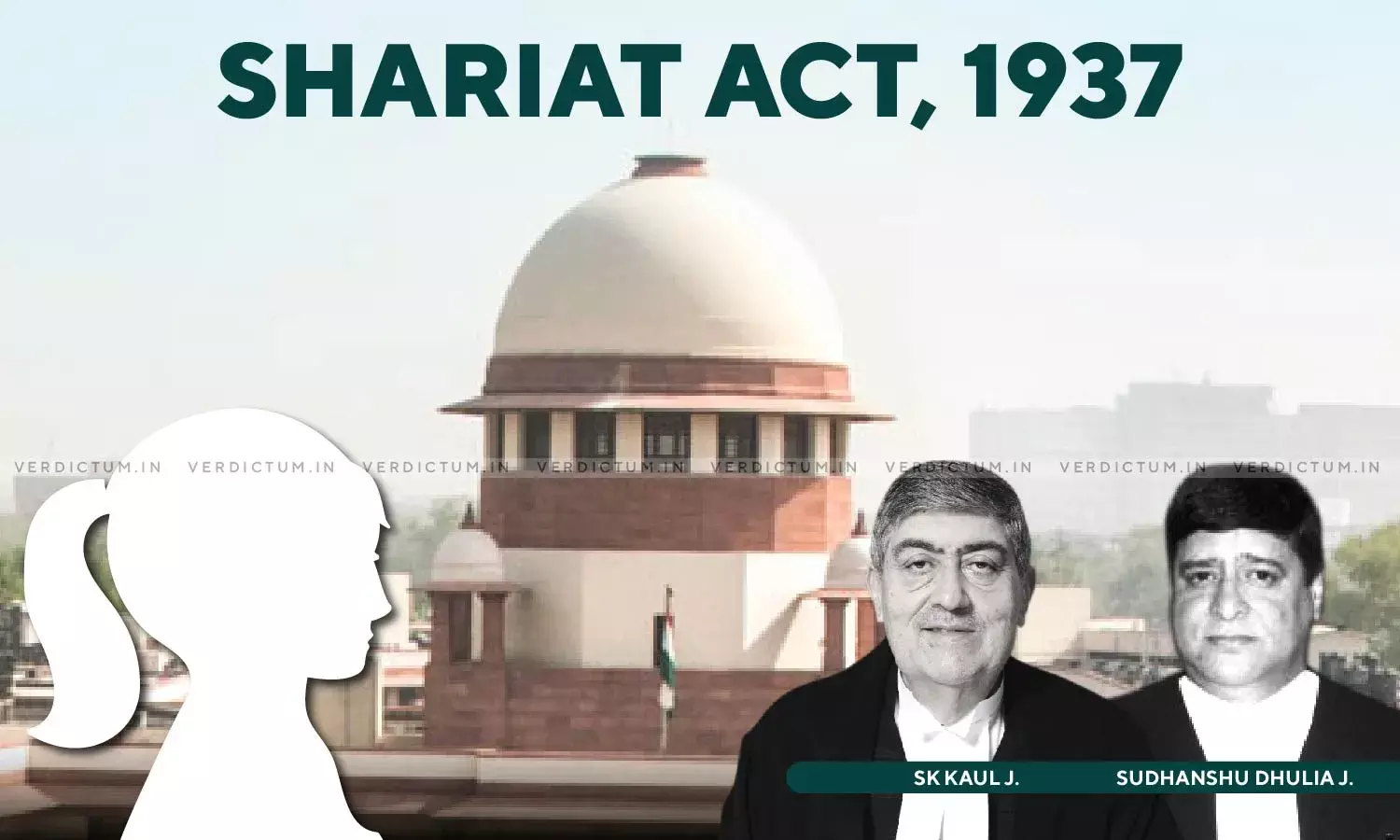Giving Equal Rights Irrespective Of Religion Is In The Legislative Domain: Supreme Court While Dismissing Plea Challenging Shariat Application Act
The Supreme Court has refused to entertain a writ petition seeking equal rights in succession to Muslim women which is otherwise denied to them by virtue of the Muslim Personal Law (Shariat) Application Act, 1937 considering that the subject matter falls within the legislative domain. The plea also challenged the whole of the Shariat Application Act 1937.
The Act mandates that the Muslims in India shall be governed by the Shariat law in the matters of intestate succession, marriage, dissolution of marriage, maintenance etc.
The petitioner- Sabina Yusuf Lakdawala, while contending that the Shariat Act passed in the colonial era of the British Raj is violative of Articles 14, 19 and 21 of the Constitution of India, heavily relied on the need for a Uniform Civil Code to argue her case.
However, refusing to entertain her plea, a bench of Justice Sanjay Kishan Kaul and Justice Sudhanshu Dhulia observed, “We can’t accede to the prayer made in the writ petition which amounts to giving equal rights in succession, irrespective of the religion. If this has to happen, it is the legislative domain”.
Advocate Mathews J. Nedumpara appeared for the petitioner.
The plea seeking equal rights irrespective of religion read, “There is absolutely no place for discrimination between man and woman in Islam, the issue is about Quranic interpretation of Islamic rules, which are influenced and coloured with rights more in favour of the men than women. Islam as it stands is absolutely flawless but its interpretation by later generation is real cause behind the disparity and inequality in the treatment to the women”.
The petitioner has sought enforcement of her fundamental rights of just and equitable right of inheritance to the estates of her late husband, who was a prominent builder, and a film financer who died while in jail on September 9, 2021.
As per Section 2 of the Muslim Personal Law (Shariat) Application Act, 1937, the petitioner who is otherwise entitled to fifty per cent of the entire wealth of her husband would now be entitled to only 12.50 per cent of her late husband’s estates.
Therefore, in the plea it was urged that only matters of purely religious nature cannot be interfered with by the judiciary. However when there is a question of public welfare, then the Courts are required to step in to secure the interests of security and sovereignty of the country.
Thus, the petitioner approached the Court to augment the limited and restricted remedy she is able to garner under Muslim Personal Law (Shariat) Application Act, 1937 with respect to share among other sharers under said Act, in inheriting the property of all kinds, on the basis of equity.
Highlighting the necessity of a Uniform Civil Code in the country, the plea read, “The quest towards a UCC serves as a testing point of the true nature of our democracy. Impressively written into Part IV Article 44 of the Indian Constitution as a Directive Principle of State Policy, its aim to achieve a far-reaching equality for all Indians alike in the realm of civil and personal laws as initially conceptualized by the makers of the Constitution, has simply remained a distant dream. Mired with ferocious debates fuelled with the 14 cataclysm of religious angst, this vision of our founding fathers still remains an aspiration”.
“It is a legitimate expectation of the citizens of India that State that it is high time to seriously think about bringing in Uniform Civil Code in the back drop of the development of passing of Women’s Reservation Bill on September 18, 2023, as a landmark moment for gender equality, especially in terms of women’s political leadership and the same steps are required to be taken by the Parliament to streamline all the respective personal laws and once again the highest judiciary has the potential to trigger or initiate development by directing the law makers to contemplate in bringing about parity among men and women in almost all aspects of life keeping in view interest of future evolving society”, the petition further read.
Cause Title: Sabina Yusuf Lakdawala v. Union Of India & Ors.
Click here to read/download the Order




